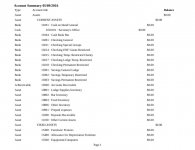Jashley73
Titanium
- Joined
- Jan 24, 2013
- Location
- Louisville, KY
I've been hanging out on PM for around 5 years now, and even before that I've had the ambition to have my own business. I finally have a good, workable idea, that allows me to 'ease' into business without spending tons of cash/debt. This is more of a "service" based business, and could possibly dovetail nicely with my current day-job - we'll see. I'm not getting too optimistic, but it should be in their interest as well. (Regardless, nothing puts the smack-down on new-found enthusiasm like querying the PM crowd - so let me have it...) 
Anyway, I have an appointment with my accountant next week to discuss the "how to" and "what do I..." issues of a new business. I suspect most of my questions at the start will be related to filing with state & federal? agencies, taxes, etc - mostly legal & tax related questions up front.
There's other things I need to consider as well, and this is where I could use some pointers.
-Book keeping? - Will some entry level software, such as QuickBooks suffice?
-Billing/Invoicing? I understand the nuts & bolts of billing etc, (at least I think I do) but I suppose I need to think about terms & conditions, etc...
-The business would most certainly need to purchase liability insurance, so I could use some pointers there as well. I do know a couple people in insurance sales to reach out to. Even if they don't sell liability policies, they could offer a referral, but I'd still appreciate pointers here too.
-OT but I do have a few friends/family to turn to for "moral support" who own their own businesses too. If there's something I need to discuss with them/ask for advise, I can do so, and I'm sure they'd be happy to discuss.
I'm sure there's 20 other things I need to be thinking about as well, but please shine some light on the areas I'm missing. Thanks in advance.

Anyway, I have an appointment with my accountant next week to discuss the "how to" and "what do I..." issues of a new business. I suspect most of my questions at the start will be related to filing with state & federal? agencies, taxes, etc - mostly legal & tax related questions up front.
There's other things I need to consider as well, and this is where I could use some pointers.
-Book keeping? - Will some entry level software, such as QuickBooks suffice?
-Billing/Invoicing? I understand the nuts & bolts of billing etc, (at least I think I do) but I suppose I need to think about terms & conditions, etc...
-The business would most certainly need to purchase liability insurance, so I could use some pointers there as well. I do know a couple people in insurance sales to reach out to. Even if they don't sell liability policies, they could offer a referral, but I'd still appreciate pointers here too.
-OT but I do have a few friends/family to turn to for "moral support" who own their own businesses too. If there's something I need to discuss with them/ask for advise, I can do so, and I'm sure they'd be happy to discuss.
I'm sure there's 20 other things I need to be thinking about as well, but please shine some light on the areas I'm missing. Thanks in advance.






